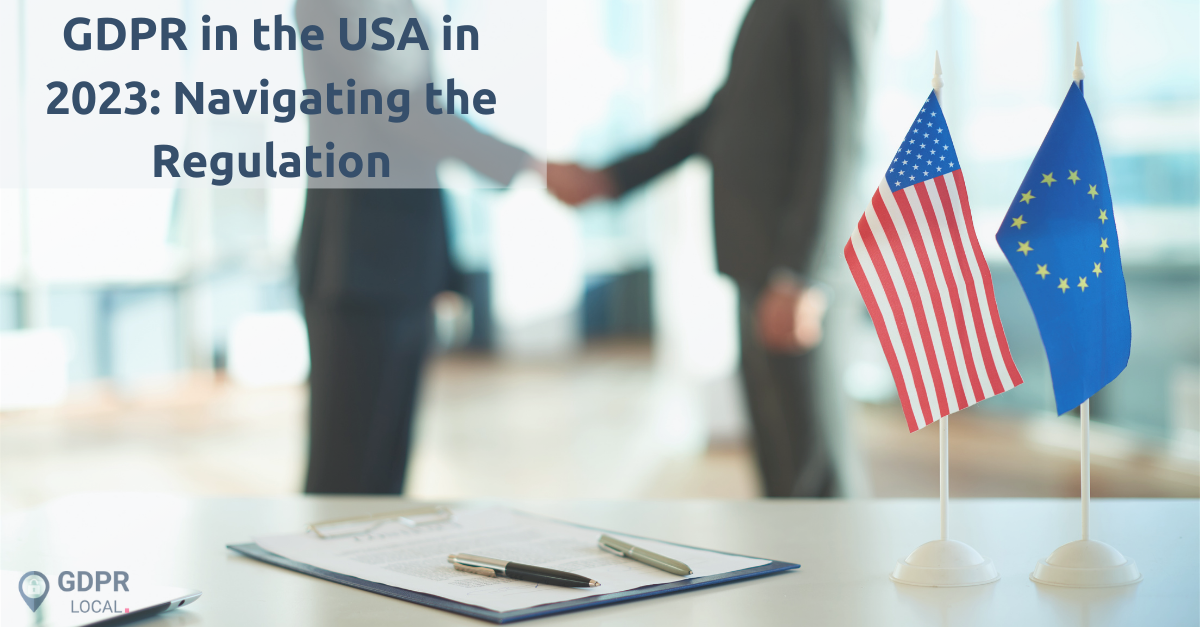
GDPR in the USA in 2023: Navigating the Regulation
AI. GDPR. Data transfers. Whatever angle you approach data protection from, 2023 has thrown up plenty for US businesses to absorb and adopt. We look at the story so far this year and ask what the implications are for your company.
Data protection expectations are changing. Driven by legal, security and technological considerations – and the need to build customer trust – data protection in the US is a complex landscape of domestic and international legislation and navigating it requires an expert. Here, we explore why an EU GDPR representative is so important to helping you stay ahead of the changing legal picture, particularly regarding the General Data Protection Regulation (GDPR).
Keeping Up to Date with GDPR Developments in the US
If you deal with data, you’re probably familiar with GDPR. Its influence stretched far beyond the borders of its EU creators long before 2023, of course, but GDPR isn’t a one-hit-and-done deal. It will continue to evolve in terms of application and interpretation as well as legislation.
Only recently, for example, the European Commission proposed a “new law to streamline cooperation between data protection authorities” when enforcing the GDPR in cross-border cases. The headline aim is to reach speedier and less fractious conclusions to investigations and ensure affected individuals reach swifter remedies. In practice, however, and as the Commission’s website notes, it’s really about ensuring stronger enforcement.
Such changes will directly affect US businesses, but unless you’ve got an ongoing relationship with an EU GDPR consultant, chances are you’ll be unaware of the proposals.
AI, Machine Learning and GDPR: Striking a Balance
If AI isn’t already having a major impact on your industry, it’s about to. Yet harnessing the capabilities of AI and machine learning needs to be balanced against data protection considerations.
There is a risk, particularly in the US market which dominates the world’s tech scene, that the drive to explore the potential of AI raises a growing number of questions about transparency and consumer consent.
In a study of car brands, for example, Mozilla Foundation found 25 car brands failed its privacy tests relating to security, data control and AI. Tesla failed all the tests.
It’s true that legislation is scrambling to catch up with an AI-driven world that law makers could have barely imagined just a few years ago. Yet American businesses need only look at GDPR – the world’s most advanced data protection mechanism – to see where US law is likely to develop next.
The GDPR rep, therefore, isn’t simply a conduit for complying with EU data protection law. They are the canary in the coalmine, helping US businesses ensure their growing use of AI stays on the right side of legal and ethical data use standards.
Navigating Data Transfers with Precision
In a globalized world, data transfers across borders are commonplace. Yet data privacy regulations like GDPR complicate these transfers and US businesses must be cautious and transparent when sharing data with international partners.
Selecting GDPR service providers experienced in managing cross-border data transfers is increasingly vital to remaining compliant while maintaining business relationships.
Compliance Platforms and Audits: Streamlining Your Efforts
Even with a GDPR representative in your corner, data compliance can still feel overwhelmingly complex for many US businesses. Fortunately, the growth of compliance platforms is helping to simplify the data protection journey.
These platforms offer tools to manage data, track consent and monitor compliance. At their best, they are user-friendly, customizable and offer plenty of customer support.
Coupled with regular audits completed by your GDPR rep, these platforms can help identify gaps, rectify issues, and ensure ongoing compliance. And while they are of immediate and obvious value in terms of complying with the EU GDPR, they can be put to use at home too, helping you build the same spirit of trust with US consumers.
Navigating the Horizon of Data Privacy
In the US’s evolving data landscape, GDPR, AI, and global data transfers present challenges. Yet for the organizations that get compliance right, they present big opportunities too.
A GDPR representative can help you stay informed about GDPR updates and future legislative shifts. They can help you embrace AI sensibly and compliantly. They can help you ensure transparent data transfers, and leverage compliance platforms more effectively.
All the above matters because it can help ensure compliance, and compliance protects you from financial and reputational damage.
But more than that, compliance ensures yours is a business that respects individual rights, that builds trust, and which contributes to a data-driven future that values privacy as much as innovation.
Explore how our GDPR services can support you now, get data protection advice or, for questions about your next steps, call us on +1 303 317 5998.